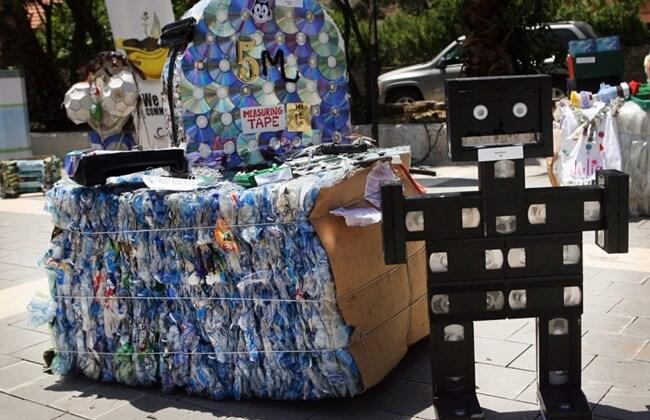Although the effects of individual action might appear to be minimal, experts told The Daily Star that even small changes in people’s behavior are helpful. “Sorting at source is one of the pillars of a good waste management, but sustainable waste management always starts with responsible and sustainable consumption,” said Christ Der Sarkissian of Arc en Ciel, a nongovernmental organization that supports sustainable social, environmental and economic development. “Lebanese consumers should be aware that while some packages are made from recyclables, other [examples] of the same item are made with non-recyclable packaging,” said Der Sarkissian, who is responsible for implementing a sustainable solid waste management strategy in the environmental program at Arc en Ciel. Being a responsible consumer begins not just with type of products you buy, but with the quantity that you purchase. “The first thing, in addition to sorting at source, is for citizens to reduce consumption,” said Ziad Abi Chaker, CEO of Cedar Environmental, a firm that specializes in building municipal recycling facilities. One simple way is to reduce the number of disposable items one uses, such as taking a carrier bag to the supermarket instead of using the plastic ones provided. Abi Chaker, an environmental and industrial engineer, provided another simple example: birthday parties. Instead of buying disposable plastic cups and plates, Abi Chaker suggested people go back to basics and use glass and china. Though the switch requires the extra effort of washing the cups and plates, a broad application of such changes could help the country tackle its waste problem. “During a crisis, it is better to refrain from using disposable items as much as possible,” Abi Chaker said. “When you reduce your usage of disposable items, you reduce what you send to the garbage. This impact becomes especially apparent during a crisis [like this one].” The country also has a problem dealing with its organic waste. Lebanese are known for their generosity, but experts suggest that they refrain from always trying to prepare a feast for lunch. “Try as much as possible to eat all your food,” Abi Chaker said. “Don’t overprepare food [because it often] goes to waste … cook enough for your family to consume in one meal.” Shady Sadek, founder and manager of Runwaste Company, a recyclable waste management company, agreed. His firm works to recover cooking oil, aluminum cans and paper goods, among other items. “Our problem in Lebanon is that up to 55 percent of our waste is organic waste from homes and restaurants. [Restaurants] are the biggest producers of this waste,” Sadek told The Daily Star. He said there’s a responsibility for restaurants to take part in solving the issue as well. Sadek said that Lebanese tend to order lots of food when dining out, much of which eventually goes to waste. “We should have a system customized for the producer, and not all producers are similar,” he added. Abi Chaker suggested another solution, for those who have access to a garden or green space. “You can make the extra effort to dig a hole in the ground and place your organic waste in the hole. You’re giving those nutrients back to the soil. This will reduce the amount of garbage that goes to the street.” Abi Chaker said burying or composting organic waste is simply another type of recycling. “Recycling is taking materials that were destined to be thrown away and remanufacturing them into new useful products. It’s a circle that turns on itself.” In the case of organic waste, “you’re recycling your organic food into organic fertilizer for the soil,” he said. People can also significantly reduce waste by reusing and repurposing items they would usually throw away. Think twice before tossing out that glass bottle, which can be transformed into a vase to decorate your house. Repurposed glass jars have become popular as glassware in recent years, and websites such as Pinterest are filled with novel ideas on how to reuse a wide variety of household items. Deco-recycling provides a great way to beautify your home and help preserve the natural beauty beyond it at the same time. The Daily Star











